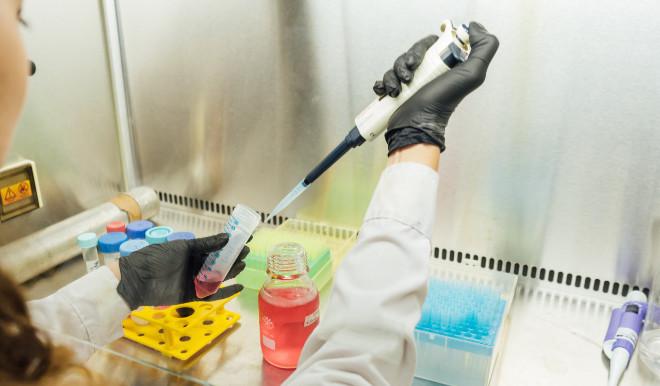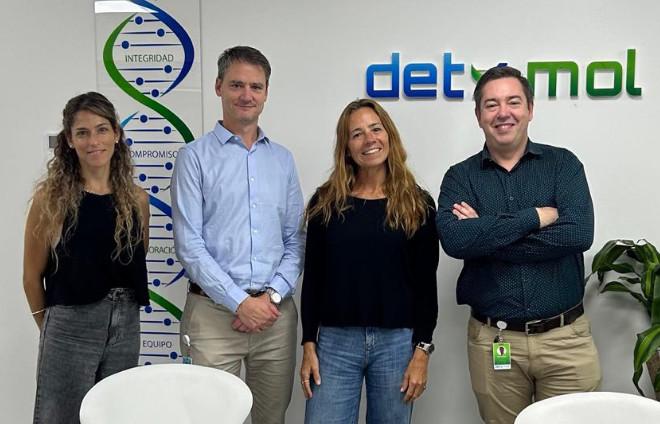
The circulation of contaminated food represents a risk to the population. Due to its economic impact on health systems, more and more resources are allocated to implement viral monitoring and control systems.
In most countries, such surveillance also extends to imported products. Its regulations require a certification that certifies the absence of norovirus (NoV) and hepatitis A virus (HAV) for all elements from abroad intended for human consumption.
Argentina lacks regulation in this field. That is why they do not exist in the market national food virus detection kits. For export firms, that makes it very difficult to meet the requirements of the communities where they try to place their products.
It becomes relevant if one considers that Argentina is the second largest producer of blueberries in South America and the third largest producer of strawberries. It exports to more than 25 international markets and practically all its production is sold as frozen fruit to make jams, sauces, juices and liqueurs.
Currently, several laboratories in Argentina offer this service, but with homemade techniques (in-house) and without validation under the requirements of international regulations. This causes a lack of traceability in the process, as well as an inability to standardize methods.
Although it is feasible to import virus detection kits, these do not contemplate the pre-analytical treatment of the food matrix, a processing prior to analysis but vital to guarantee the reliability of its result.

The project was one of the five selected to access the grant of the Fund for Technological and Social Innovation of the UNC (FITS), which manages the UNC’s Secretariat of Innovation and Technological Linking.
The goal of the team is to finish the process with a prototype of the kit that has passed the sensitivity and specificity tests, is validated in the field and based on simple and robust methodologies. That will lay the foundation for the production of the first pilot batches.
Ultimately, the key to the initiative is to provide the market with a locally created tool, at affordable prices and validated by international regulations.
The inclusion of hepatitis E virus obeys two reasons. First, because it is endemic in countries like India and China. Internationally, it is currently analyzed including pathogens under monitoring.
Besides, because there is scientific evidence of its circulation in Argentina. Viviana Ré, the project director, was one of the researchers who confirmed her presence in the province of Córdoba. At that time, his work concluded that at least 4.4% of the population had ever been in contact with it in his life.
A genetic fingerprint detector #
There are countless roads through which a virus can reach the products that are consumed daily. One is the water that is used to clean or water plants and vegetables. Another is manipulation without appropriate precautions by infected people.
While these pathogenic particles cannot reproduce, they are very resistant and a few are enough to trigger infections.
The diagnostic kit on which Inviv and DETx MOL are working will contain the reagents for both food preparation (pre-analytical processing) and for analysis (molecular detection of viruses by PCR). It will also include a detailed protocol of the steps and tasks to be carried out in each stage of the procedure.
The choice of molecular methodologies is due to the fact that this type of analysis is extremely precise: they are designed to detect the presence of the genetic code of viruses.
One of the challenges that the team has already solved is to identify multiple viruses and its different genotypes simultaneously and in a single procedure. Technically, these tests are called “multiplex” and that approach is exclusive condition for the kit to be commercially viable.
Since the test tracks the nucleic acid of these pathogens, the first step in the project was to build an exhaustive database with their genetic information and that of all its variants to monitor.
This task involved relieving the nucleotide sequences of each of the genotypes in verified international records, something like creating an album with its genomic fingerprints.
That stage has already concluded and with that data, the ‘primers’ were designed and adjusted, key components in the qPCR (real-time polymerase chain reaction) technique that the kit will use.
Developed in the 1980s, PCR is used to amplify genetic material. In simple terms, it generates millions of copies from a single initial molecule. Its advantage is precision. As little the DNA is very, it will be detected and multiplied exponentially until it turns visible by special equipment.
About DETx MOL #
Based in Rosario, province of Santa Fe, this technology-based firm specializes in the design, optimization, validation and production of molecular kits for the diagnosis of infectious and genetic diseases in humans.
The company has certification for quality management systems, both at a general level (ISO 9001: 2015), and for the manufacture of medical products (ISO 13485: 2019). It also has enabling of the National Administration of Medicines, Food and Medical Technology (ANMAT) as a manufacturer.
A must to highlight is that part of its professionals are researchers from CONICET and professors in the area of Virology on the Faculty of Biochemical and Pharmaceutical Sciences of the National University of Rosario.

The main advantage of partnering with DETx MOL lies in their experience in producing this type of multiplex kits. The partnership between the two institutions is also due to the relationship of technical-scientific cooperation that they have been building in recent years.
Currently, part of the Inviv team is at the facilities of the Santa Fe firm. There they work on the optimization of the reagents and the technique. In addition to the technical advice provided by its professionals, DETx MOL has the necessary infrastructure to perform additional tests, precision tests and adjust the sensitivity, specificity and detection limit of the technique.
Scope of application: food industry - Argentina
Leading: Viviana Ré - Institute of Virology “Dr. J. M. Vanella” - Faculty of Medical Sciences - UNC
Work team: María Belén Pisano, Silvia Nates, Verónica Prez, Guadalupe di Cola, Anabella Fantilli and Bianca Filoni
Funding: $ 10 million pesos plus scholarship for eight months
Counterpart: Detx Mol S.A.
Area of Natural, Exact and Technological Sciences
The “Fund for the Technological and Social Innovation of the UNC” (FITS) is a financing scheme of the Secretariat of Innovation and Technological Linking of the UNC designed to promote the linking of actors of the scientific-academic system with society and the entrepreneurial ecosystem. The 2024 call distributed 70 million pesos among the five applied research projects that were selected among the 46 postulated initiatives.

